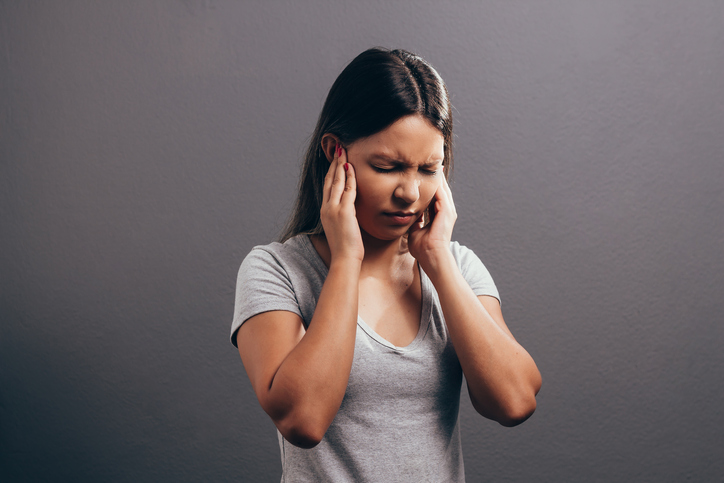
What Happens During a Sound Sensitivity Test?
Hypersensitivity to sound is a rare condition that affects about one in every 50,000 people. This type of hearing sensitivity disorder can lead to fears of loud noises, avoidance of social situations and decreased tolerance for normal noises, like the running of a vacuum cleaner. If you are experiencing any of these symptoms and believe you may have hypersensitivity to sound, a sound sensitivity test can be conducted to determine whether you’re affected by this problem.
During a sound sensitivity test, your audiologist will play a variety of tones through headphones or ear inserts in an attempt to determine your hearing thresholds (the softest sounds you can hear), your most comfortable loudness levels (MCLs), and your uncomfortable loudness levels (UCLs). By plotting your thresholds, MCLs, and UCLs, the audiologist can determine if your sensitivity to noise is normal or indicates hypersensitivity.
WHEN SHOULD YOU GET A SOUND SENSITIVITY TEST?
If you are an adult, a hearing test is recommended every 10 years, and every three years after you turn 50 years old. You should also get a hearing test if you experience symptoms of sound sensitivity disorder. Examples of these symptoms are:
- Discomfort when hearing low-intensity sounds.
- Sounds heard at a normal volume seem uncomfortably loud and may sound distorted.
- Loud noises may sound so loud that the ears pop.
- Quiet sounds are comfortable to hear.
WHAT HAPPENS IF YOUR HEARING TEST REVEALS HYPERSENSITIVITY TO SOUND?
If a sound sensitivity test reveals hypersensitivity to sound, the audiologist will first try to determine the cause before treating the condition. Understanding the root cause of hypersensitivity to sound can reveal an obvious and simple solution, like a patient wearing ear protection at their frequently loud occupation. If the cause is permanent damage to the ear, the hearing specialist will recommend a course of treatment to help adjust their hearing to everyday sounds.
People with hyperacusis can sometimes develop phonophobia, a fear of loud noises. People affected by phonophobia may retreat to isolation, usually in their home where they can control the sound volume. Some even become afraid to engage with others, go to work or participate in beloved hobbies — all to avoid loud noises. To prevent these symptoms from occurring, regular hearing tests and examinations are recommended.
WHAT CAUSES HYPERSENSITIVITY TO SOUND?
Hyperacusis is typically caused by damage to the inner ear. People are able to hear sounds because of tiny hairs located within the inner ear. These hairs are very sensitive and can be damaged by loud noises exceeding 85 decibels or more. If you have been exposed to loud sounds on a regular, or if you were exposed to an extremely loud noise at close range, hair cells could have been damaged, causing permanent hearing damage.
Other events that can cause hyperacusis include head trauma, medication, and airbag deployment. If you have a condition like autism or Lyme disease, you may be at an increased risk for hypersensitivity to sound.
HOW WILL YOUR AUDIOLOGIST TREAT HYPERSENSITIVITY TO SOUND?
Once your audiologist determines the cause and severity of your hypersensitivity, a treatment plan will be executed. Unfortunately, hypersensitivity to sound is often permanent. However, treatment can help the patient cope and alleviate the symptoms to improve quality of life. When not permanent, treatment usually includes stopping a certain medication or suggesting treatment on another health issue that could be a factor.
Treatment can include sleep aids, which are helpful if loud noises are causing insomnia. A hearing expert may also recommend white noise, which drowns out other noises that can be disruptive to sleep.
Depending on how you are handling your condition, you may also benefit from counseling, which can help you manage some of the anxiety and frustration that comes with hypersensitivity to sound. A therapist may suggest a variety of strategies for helping you control those feelings and maintain good relationships with the people in your life, who may also need help learning how to accommodate your condition.
Sound therapy is an extremely useful treatment for people with hypersensitivity to sound. Sound therapy does not reduce the volume or make sounds seem less loud, but helps patients affected by hyperacusis feel less sensitive to uncomfortably loud noises. Sound therapy can also teach you strategies for managing your condition.
ARE HEARING AIDS HELPFUL IN TREATING HYPERSENSITIVITY TO SOUND?
Hearing aids can be helpful if you are suffering from hyperacusis in a variety of ways. Noise generator hearing aids produce a hissing noise or white noise that makes uncomfortably loud sounds seem less jarring and intrusive. These hearing aids do not amplify noise — they simply dampen them.
Many people with hypersensitivity to sound also experience tinnitus. In this case, hearing aids can amplify sounds in the environment over the sound of the tinnitus, which can in turn make it easier to have normal conversations. If your audiologist suggests hearing aids to help manage tinnitus, they will help you adjust the settings and volume in your hearing aid to amplify the noise just enough to be comfortable.
DO I NEED A SOUND SENSITIVITY TEST?
If you’re experiencing symptoms of a hearing disorder — either hypersensitivity to loud noises, or difficulty hearing noises in loud environments, we recommend receiving a hearing test. A good audiologist will use the sound sensitivity test as a basis for a diagnosis and treatment, or as a jumping off point for further testing. Regardless of your symptoms, the sound sensitivity test will likely be a first step toward treatment, recovery, or sound therapy to help manage your condition.
SOURCES
- American Speech-Language Hearing Association, Pure-Tone Testing
- American Academy of Family Physicians, Audiometry Screening and Interpretation
- American Speech-Language Hearing Association, Childhood Hearing Screening
- American Speech-Language Hearing Association, Hearing Screening
- American Speech-Language Hearing Association, Hyperacusis
- Hearing Health Foundation, Hyperacusis
- Hyperacusis Network, Four Types of Sound Sensitivity
- Victoria State Government, Hearing Problems Hyperacusis
- British National Health Service, Noise Sensitivity (Hyperacusis)
- University of California San Francisco, Hyperacusis Signs and Symptoms
- Hearinglink.org, What Is a Hearing Test?
- Hearing Like Me, Ask Anna: Will hearing aids help my Hyperacusis?
- WebMD, Hyperacusis

